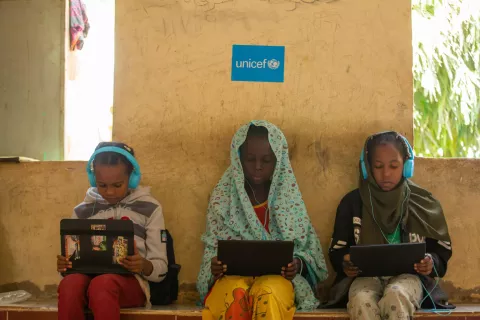In South Sudan, child malnutrition worsens as conflict hinders response
Millions of people in South Sudan are struggling to feed themselves as a years-long conflict takes its toll on food production and the economy. Children are the most seriously affected, with a sharp increase in the number being treated for malnutrition

Millions of people in South Sudan are struggling to feed themselves as a years-long conflict takes its toll on food production and the economy. Children continue to be the most seriously affected, with a sharp increase in the number being treated for malnutrition.
JUBA, South Sudan, 4 August 2016 – Before the fighting that shook South Sudan’s capital of Juba last month, staff at the Al Sabah children’s hospital were admitting about 30 children a day for the treatment of malnutrition. Today that number often surpasses 80.
Sunday Samuel arrived ten days ago with her two-year-old daughter Bismah, after the child, sick with malaria, stopped eating. She was treated for oedema, given medicines for malaria and fed with a therapeutic milk formula called F-75. Her mother said she had improved, though she was still underweight and had a persistent cough.
Like thousands of others, Sunday and her family fled their home during the four days of intense clashes, returning once a ceasefire had taken hold. But even before the latest violence, they struggled to feed themselves. Nearly three years of insecurity has fractured South Sudan’s economy. With inflation running at around 300 per cent, basic food supplies are now too expensive for many families.
“Life in Juba is so difficult. You have to be rich now to even buy a bag of flour,” said Sunday as her daughter slept against her chest.
A recent survey warned that more than one third of South Sudan’s population – 4.8 million – people are facing severe food shortages. Malnutrition rates in 7 of the country’s 10 states have reached the emergency threshold, according to UNICEF estimates, meaning that more than 15 per cent of the population is malnourished. In some areas it has reached 33 per cent.
“This latest crisis has severely affected our ability to respond,” said Joseph Senesie, UNICEF’s nutrition specialist in Juba. “Therapeutic food supplies that would normally come by road have been interrupted due to insecurity forcing us to fly in the most urgently needed formulas.”

The first air shipment brought hundreds of boxes of therapeutic food supplies used to treat severely malnourished children, and much of it was destined for Al Sabah.
Doctor Rita Charles works in the hospital’s nutrition ward. She said the recent conflict has made it more difficult for people to cope.
“Normally, [families] could rely on what they can grow on small plots of land outside of the city, but because of the insecurity they can no longer reach those areas,” she said.
As Sunday bathed her crying daughter at the hospital, she said she has lost hope for the future and she looks to humanitarian organizations and the staff at Al Sabah for help.
That night, despite the care from the doctors and nurses and comforting from her mother, Bismah passed away. The next morning Sunday returned home alone.



